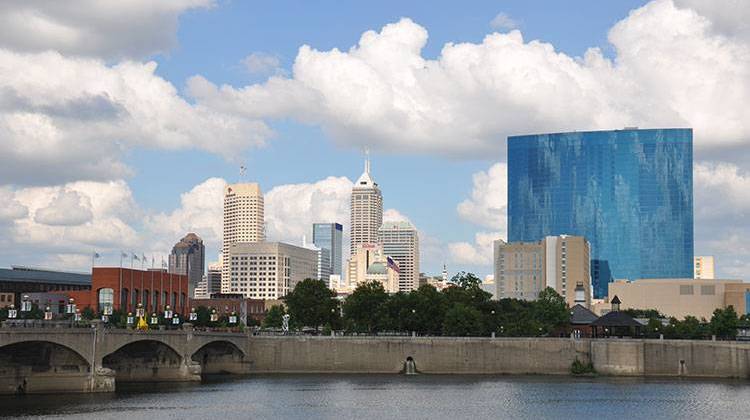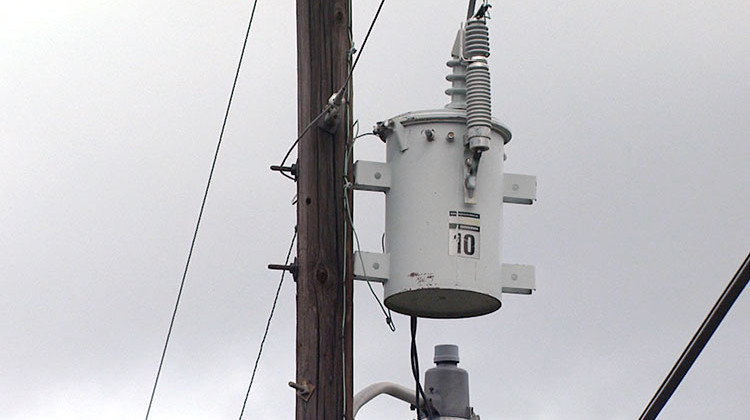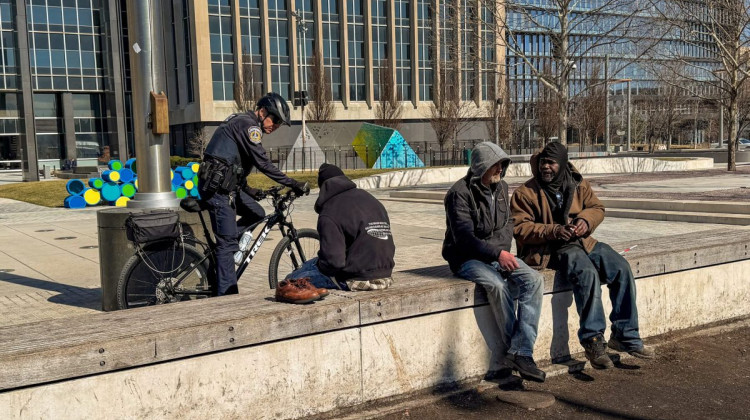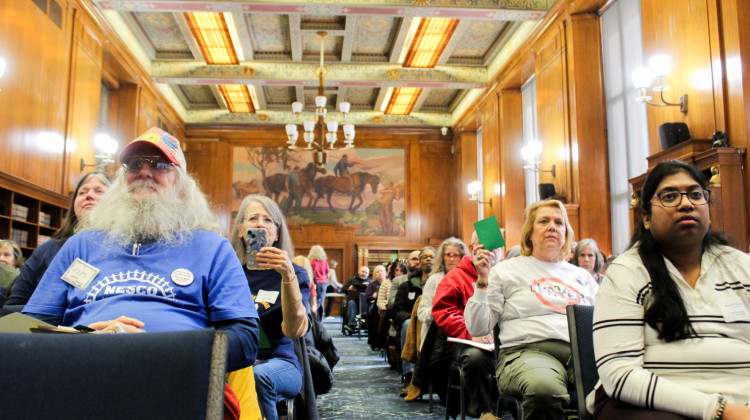
A number of former Indianapolis city employees have spoken out about their experiences working for the city.
WFYI FILE PHOTOStories of sexual harassment and misconduct inside Indianapolis Mayor Joe Hogsett's administration came to light last summer. The scandal led to an independent investigation. But some who made allegations say the findings fell short.
The National Women's Defense League represented seven people who had come forward with experiences of misconduct.
WFYI's Jill Sheridan sat down with one of those people, De'Andre Baker, to talk about his experience and accusations of harassment and discrimination inside a city department.
This transcript has been edited for style and clarity.
Jill Sheridan: Can you talk a little bit about what happened to you inside the Department of Public Works, DPW?
De'Andre Baker: I started working for DPW August, 31, 2020. The first incident I had was, I believe it was November where I was sexually assaulted, when that happened. The first thought process was, I hate to actually say this, but being a part of the LGBTQ+ community, I've experienced this type of behavior before, especially when it comes to night life: You're going out, and people bumping you and thinking that you're attractive doesn't mean that it's right.
But I'm bringing that up to say, when it happened, my mind immediately calmed me down, like this has happened to you before, but then it hit me: You're at work. This is a professional setting, so once that kicked in, the first process was to protect myself.
Immediately I started looking around for cameras to prove, to show, when I did speak up for someone to believe me and say, 'Hey, this happened. This is when it happened; check the cameras.' Then I realized there was no cameras there at all. I walked outside the building, there was no cameras, and I realized, 'Who would believe me?'
So what I started to do was record and document every altercation that I had with anyone that was a superior throughout the years. I have witnessed a lot and have been through a lot of abuse, mentally, verbally, and that takes a toll on one person. So dealing with that, I had to struggle with keeping my job and being abused every day, and it just got to the point where it broke me down.
Any time I asked for help working for DPW, I never got it. Every grievance I wrote up, they just pretty much let me know that... I was told pretty much, 'Be grateful you have a job.' And, 'If you didn't want to do it, this is an at-will state; we can fire you without any cause and put someone else in your place.' I was told that at least twice working at DPW.
Sheridan: And then ultimately, what did happen?
Baker: I was terminated for fighting for myself, for speaking up. There was a lot of abuse that went there as far as intimidation, and they wanted to just, they wanted me to quit. But I was like, 'That's not happening.' I am stubborn. And I'm like, 'This is my job. I chose this job.'
Sheridan: And you experienced other forms of misconduct that you touched on a little bit.
Baker: One of my supervisors called me a sissy, called me a little girl. He came at me. He completely came at me. My safe space working there was always being in the dispatch office. I felt safe there, around the women. There was another gentleman there that was also a dispatcher, so he came and got me and pulled me out of my safe space to chastise me, called me names, and it was aggressive.
He snatched keys out of my hand, and it caused two of my fingernails to bleed. And immediately I reacted. I got loud, and I kind of ran into the dispatch office where he followed in. He continued to verbally attack me.
Sheridan: So you ended up filing charges of discrimination, and then the city responded. Talk about the experience when you got this response and what your thoughts were?
Baker: Well, the response, the position statement, was exactly what I thought it was going to be, because that's exactly how I was treated. But I knew for a fact that they weren't going to take responsibility for anything. And again, they didn't know that I had documented proof to debunk everything that they were lying about in the position statement.
So I was ready. I was sad a little bit, but I dealt with it for so long, to the point where I was just like, 'Okay, it was more of reading the position statement and being more curious on how they were going to spin it.' But then when I saw it, I was just like, 'Oh, they simply just blamed me.'
Sheridan: Let me ask you about the June 9 meeting. You were there that night when Lauren Roberts was dragged out of the council chamber. You were going to speak that evening and decided not to. First, talk a little bit about why you did make the decision to come forward, and how difficult it was to, you know, stay quiet that evening.
Baker: So I was going back and forth in my mind about it. When I got there, I was terrified. I was petrified. And when she got up, and how they treated her... seeing it on the news compared to actually being there, it's two different things. And I remember saying, 'Here's this cis white woman speaking up and telling her truth, and she has all these supporters around her.' And for them to, in so many words, tell her to hurry up and put a time limit on her experience. Not only did it frustrate me, but it scared me, because this is my first time in any type of arena like that at all.
So not only to see how she was treated, but to know that the news was there, to know that the media was there. You know, there's people that are watching the news all over Indianapolis, so to see that I knew, 'Oh, they don't care about what I have to say. If they treat her like that, I'm going to be the thug. I'm going to be the problematic black gay man. Here I am all the way at the bottom.'
It scared me. It petrified me. I started shaking. And when they grabbed her, and people came up to be like a barricade for her, and they pushed people out the way, this is just... there's no way I can speak. There's no way I can speak. I see that Indianapolis has normalized dysfunction. And not only is it normalizing dysfunction. I want people to know that if you don't speak up, this will continue to happen.
Sheridan: What would be an ideal fix? Would some of these measures that have been brought up would be good to implement, in your opinion?
Baker: I would honestly say that Hogsett needs to resign. That's the first thing. I believe... there's a lot of apologies that need to take place, even if he's not aware, as he says, and things of that nature. You are the mayor of Indianapolis; take ownership of the people that you've put in the places that they're in.
The rest of the higher ups, I feel as though there's clearly something else at play. And that's for me, I'm looking in just seeing it, because it makes no sense. It absolutely makes no sense to actually see it, and they don't think that's a problem or an issue, is weird to me.
Sheridan: Thank you so much for coming in today.
Baker: Thank you so much.
Clarification: The headline for this story has been updated to reflect that DPW is not technically under the Hogsett administration but more acurately under city government. The city did not comment on this story as there is a pending lawsuit related to these allegations.
This story is a transcription of a long-form interview. WFYI conducts these audio interviews with members of the public to hear more stories from the community.
Contact WFYI Managing City Editor Jill Sheridan at jsheridan@wfyi.org
 DONATE
DONATE








 Support WFYI. We can't do it without you.
Support WFYI. We can't do it without you.